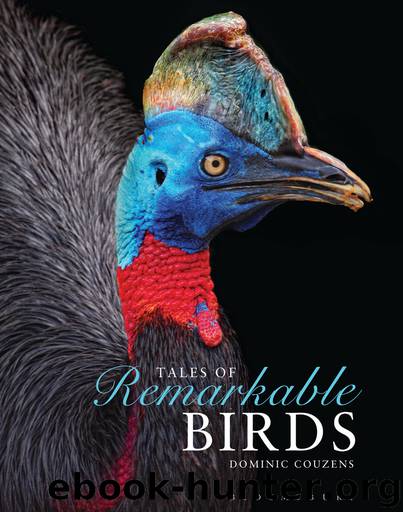Tales of Remarkable Birds by Dominic Couzens

Author:Dominic Couzens
Language: eng
Format: epub
ISBN: 9781408190258
Publisher: Bloomsbury Publishing
Published: 2015-11-07T16:00:00+00:00
The quiet, hen-pecked behaviour of male Tan-striped morph White-throated Sparrows is so different to their White-striped colleagues that they could almost be different species.
BLACK-CAPPED CHICKADEE
Memories of garden birds
A Black-capped Chickadee collects a seed. It stores thousands of small items like this away, to retrieve later when needed.
When it comes to comparing the abilities of birds and people, it’s easy to accept there are some ways in which our fellow creatures outperform us. We cannot fly, for one thing, and we are not as good as birds are at travelling accurately for a long time in a particular direction, while birds routinely migrate vast distances without any kind of help. We find it easy enough to appreciate that birds are superior in the sensory department: they see more crisply, have more of an ultraviolet component to their vision and some, such as owls, also have extraordinary powers of hearing. As it happens they also have a magnetic sensitivity that we probably lack. Birds are endowed with many physical gifts.
However, when you sit down to have coffee in the kitchen and idly watch the comings and goings of the birds at your feeders, would you be surprised to know that some of your garden companions might actually out-perform you in a more cerebral function? A variety of studies on the cognitive abilities of tits and chickadees suggest that this is indeed the case. It seems that some bird table residents have, compared to us, a superior spatial memory.
Species such as Black-capped Chickadees (Poecile atricapillus) are mainly vegetarian in the winter, subsisting primarily on seeds and nuts. There are two characteristics of these plant products that make them unusual in respect to other kinds of food. For one thing, they do not spoil quickly. Many have hard cases that are adapted to protect the seed inside from decomposing, giving them the longest possible time to be discovered by a dispersing animal. Another ecologically important aspect of seeds is that they are produced in vast quantities at only one season of the year, at least in the colder, temperate parts of the world, and that is during the autumn. The first characteristic makes it possible to store them, and the second characteristic makes it highly advantageous to store them.
In the autumn, therefore, and also during the winter when they are foraging from artificial feeding stations, Black-capped Chickadees don’t necessarily eat everything they find. Instead they will carry food items away and hide them in all kinds of different places, including clumps of lichen, moss, soft ground (even snow), dry leaves, crevices in tree trunks and behind loose bark. During the summer they will also store some animal matter, including dead spiders, although only for brief periods, but overwhelmingly it is nuts and seeds that are secreted away. These items are, remarkably, stored singly, just one seed per hiding place. It would be disastrous for a bird to put many items into a single cache, if that site was then discovered and emptied, ruining hours of effort.
Download
This site does not store any files on its server. We only index and link to content provided by other sites. Please contact the content providers to delete copyright contents if any and email us, we'll remove relevant links or contents immediately.
The Lonely City by Olivia Laing(4797)
Animal Frequency by Melissa Alvarez(4459)
All Creatures Great and Small by James Herriot(4306)
Walking by Henry David Thoreau(3952)
Exit West by Mohsin Hamid(3822)
Origin Story: A Big History of Everything by David Christian(3680)
COSMOS by Carl Sagan(3617)
How to Read Water: Clues and Patterns from Puddles to the Sea (Natural Navigation) by Tristan Gooley(3458)
Hedgerow by John Wright(3352)
How to Read Nature by Tristan Gooley(3332)
The Inner Life of Animals by Peter Wohlleben(3304)
How to Do Nothing by Jenny Odell(3292)
Project Animal Farm: An Accidental Journey into the Secret World of Farming and the Truth About Our Food by Sonia Faruqi(3212)
Origin Story by David Christian(3194)
Water by Ian Miller(3177)
A Forest Journey by John Perlin(3067)
The Plant Messiah by Carlos Magdalena(2925)
A Wilder Time by William E. Glassley(2855)
Forests: A Very Short Introduction by Jaboury Ghazoul(2836)
